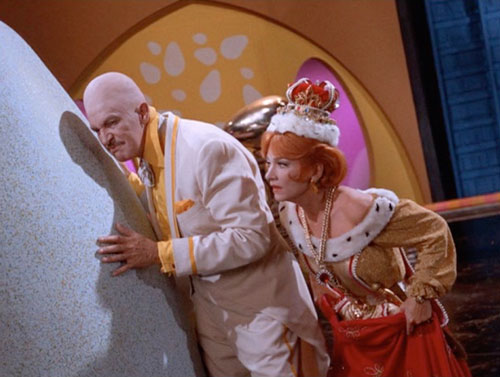High C wrote: ↑Thu Jun 21, 2018 2:40 pm
One thing I disagreed with was Paul's assessment of Anne Baxter's performance. I thought it was too far over the top and it didn't grab me at all.
I don't like these episodes much, but I consider Olga a highlight amid the season three dreariness.
She is very, very cartoony, with her Boris-and-Natasha accent, and that
is regrettable in the overall context of the show: I agree with what I think is a majority here that the balance of darkness and earnestness in the best season one shows is preferable to the jokey sitcom approach of season 3 (and much of season 2).
But, having accepted season 3 silliness for what it is (since there's no other choice), I think Olga is a gem. I love watching Anne Baxter's expressions when Olga responds to other characters' lines. (Watching her often entertains me more than the dumb dialog she's reacting to.) Maybe because the main cast had begun phoning in their performances by this point in the series, I also find it great fun to see someone so committed in her role—even if the character and her storyline are at best half-baked.
Comparing Baxter's performances as Zelda (early in season 1) and Olga (mid-season 3)—and the scripts for the respective episodes—sums up the shift in tone over the show's three seasons in a fairly tidy nutshell:
Zelda wasn't a "supercriminal," or even the real force behind her crime wave, but she was a tough cookie—it was she, not Eival Ekdol, who suspended Aunt Harriet over a pit of fire. Baxter played her pretty convincingly—at least until the appropriately hammy scene showing her reformation. (Not to mention, her episode saw two machine-gun murders and had Batman speak a line about calling the morgue!)
Olga, by contrast, is an absurd caricature, whose claim to power is somehow vested in a giant coffee pot, and whose most diabolical doomtrap involves death by caviar. It truly had become a different show.



